GEOG 389W: Position Paper on Political Ecology and the Anthropocene
VerifiedAdded on 2022/08/24
|8
|2176
|17
Report
AI Summary
This position paper explores the concept of the Anthropocene epoch, arguing that human activities have significantly impacted the Earth's environment, leading to the potential end of the Holocene epoch. The paper discusses the geological and environmental changes caused by human actions, such as deforestation, water body depletion, and the release of carbon emissions. It examines the debate surrounding the start date of the Anthropocene, considering different proposed dates and their implications. The author highlights the disruption of biogeochemical cycles, the impact on non-human life, and the constant threat of environmental disasters. The paper references key articles to support its claims, including Lewis and Maslin's work on defining the Anthropocene, and emphasizes the need for human responsibility in addressing the environmental challenges. The paper concludes by re-emphasizing the critical role of the Anthropocene epoch in reflecting human activities and their consequences on the planet.
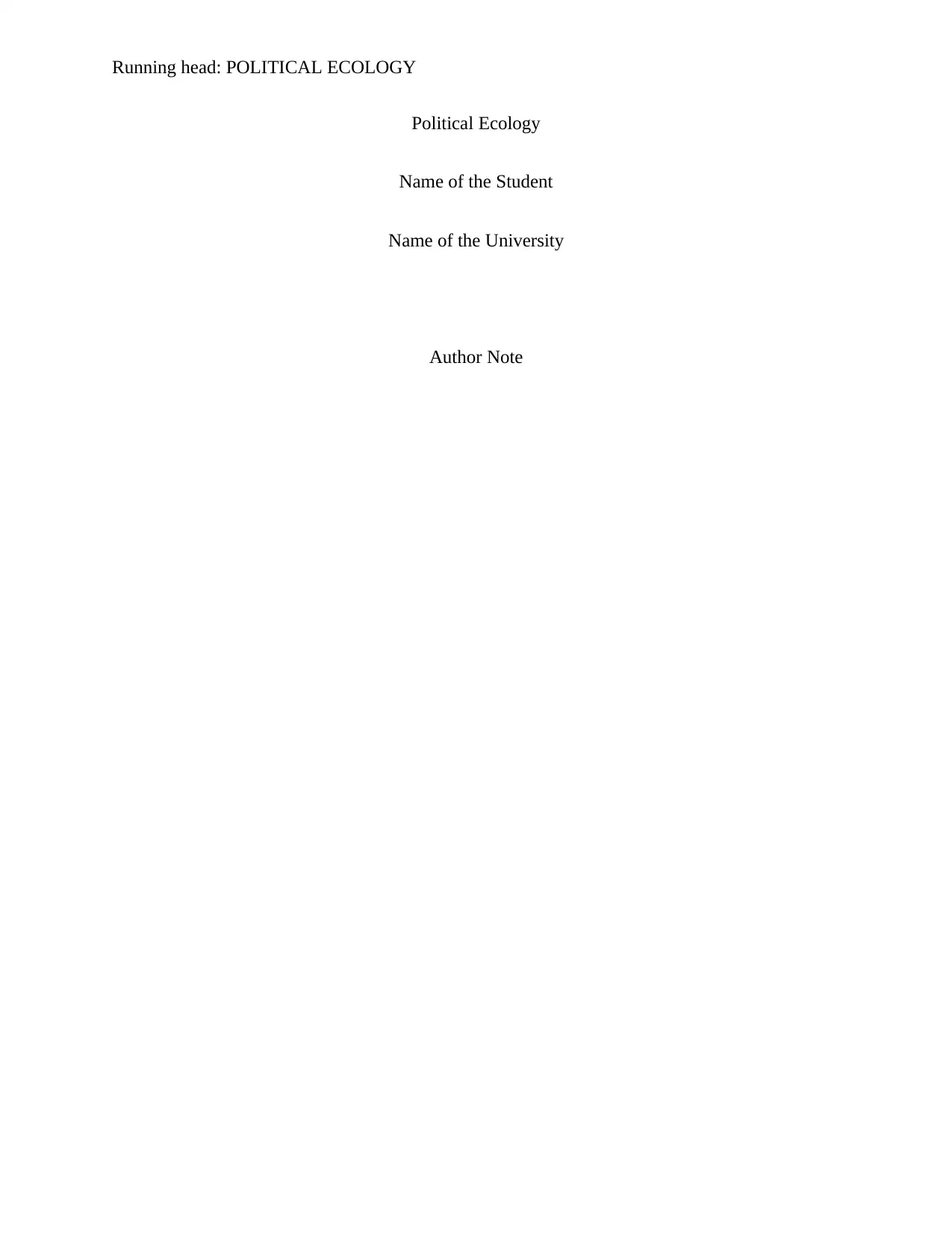
Running head: POLITICAL ECOLOGY
Political Ecology
Name of the Student
Name of the University
Author Note
Political Ecology
Name of the Student
Name of the University
Author Note
Paraphrase This Document
Need a fresh take? Get an instant paraphrase of this document with our AI Paraphraser
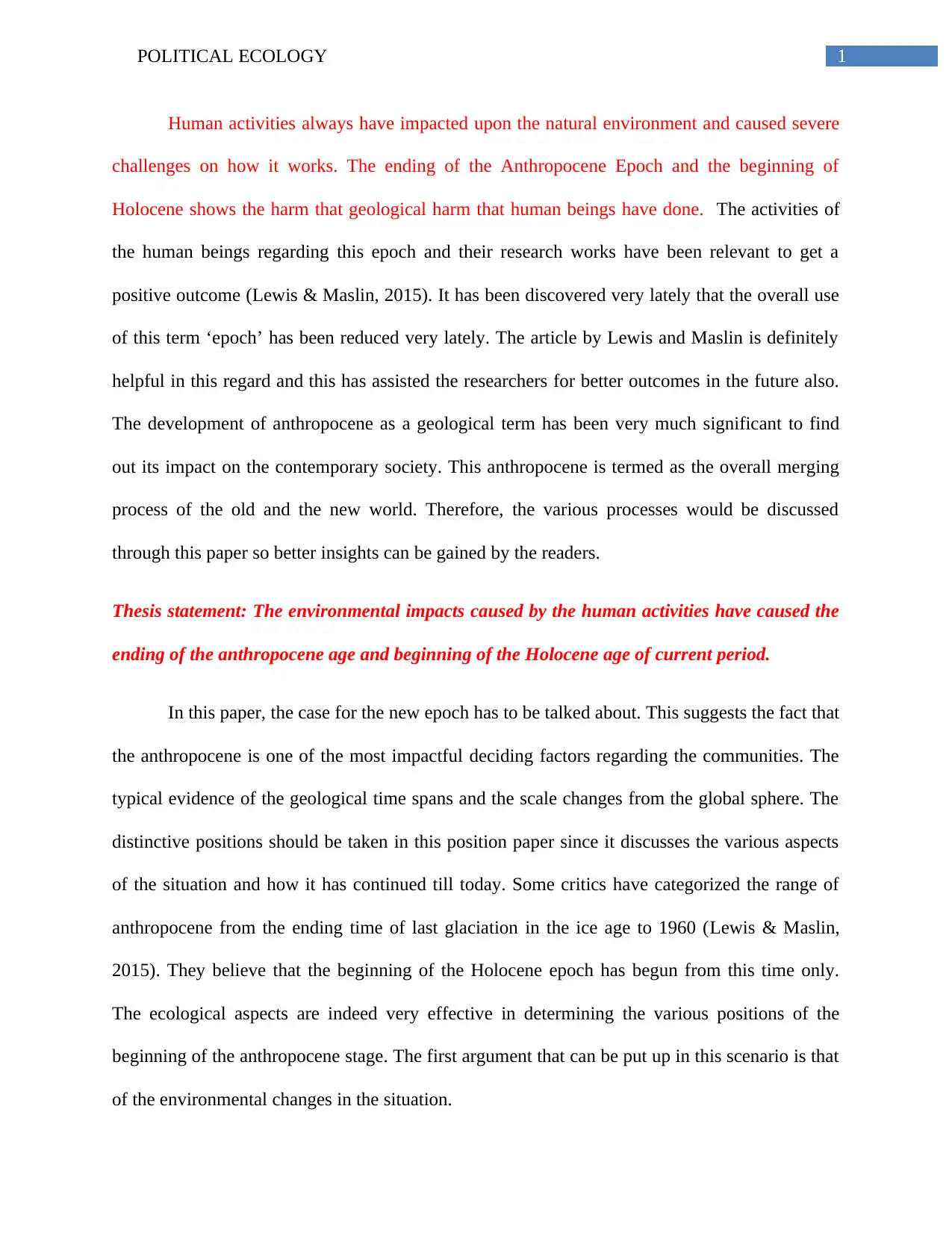
1POLITICAL ECOLOGY
Human activities always have impacted upon the natural environment and caused severe
challenges on how it works. The ending of the Anthropocene Epoch and the beginning of
Holocene shows the harm that geological harm that human beings have done. The activities of
the human beings regarding this epoch and their research works have been relevant to get a
positive outcome (Lewis & Maslin, 2015). It has been discovered very lately that the overall use
of this term ‘epoch’ has been reduced very lately. The article by Lewis and Maslin is definitely
helpful in this regard and this has assisted the researchers for better outcomes in the future also.
The development of anthropocene as a geological term has been very much significant to find
out its impact on the contemporary society. This anthropocene is termed as the overall merging
process of the old and the new world. Therefore, the various processes would be discussed
through this paper so better insights can be gained by the readers.
Thesis statement: The environmental impacts caused by the human activities have caused the
ending of the anthropocene age and beginning of the Holocene age of current period.
In this paper, the case for the new epoch has to be talked about. This suggests the fact that
the anthropocene is one of the most impactful deciding factors regarding the communities. The
typical evidence of the geological time spans and the scale changes from the global sphere. The
distinctive positions should be taken in this position paper since it discusses the various aspects
of the situation and how it has continued till today. Some critics have categorized the range of
anthropocene from the ending time of last glaciation in the ice age to 1960 (Lewis & Maslin,
2015). They believe that the beginning of the Holocene epoch has begun from this time only.
The ecological aspects are indeed very effective in determining the various positions of the
beginning of the anthropocene stage. The first argument that can be put up in this scenario is that
of the environmental changes in the situation.
Human activities always have impacted upon the natural environment and caused severe
challenges on how it works. The ending of the Anthropocene Epoch and the beginning of
Holocene shows the harm that geological harm that human beings have done. The activities of
the human beings regarding this epoch and their research works have been relevant to get a
positive outcome (Lewis & Maslin, 2015). It has been discovered very lately that the overall use
of this term ‘epoch’ has been reduced very lately. The article by Lewis and Maslin is definitely
helpful in this regard and this has assisted the researchers for better outcomes in the future also.
The development of anthropocene as a geological term has been very much significant to find
out its impact on the contemporary society. This anthropocene is termed as the overall merging
process of the old and the new world. Therefore, the various processes would be discussed
through this paper so better insights can be gained by the readers.
Thesis statement: The environmental impacts caused by the human activities have caused the
ending of the anthropocene age and beginning of the Holocene age of current period.
In this paper, the case for the new epoch has to be talked about. This suggests the fact that
the anthropocene is one of the most impactful deciding factors regarding the communities. The
typical evidence of the geological time spans and the scale changes from the global sphere. The
distinctive positions should be taken in this position paper since it discusses the various aspects
of the situation and how it has continued till today. Some critics have categorized the range of
anthropocene from the ending time of last glaciation in the ice age to 1960 (Lewis & Maslin,
2015). They believe that the beginning of the Holocene epoch has begun from this time only.
The ecological aspects are indeed very effective in determining the various positions of the
beginning of the anthropocene stage. The first argument that can be put up in this scenario is that
of the environmental changes in the situation.
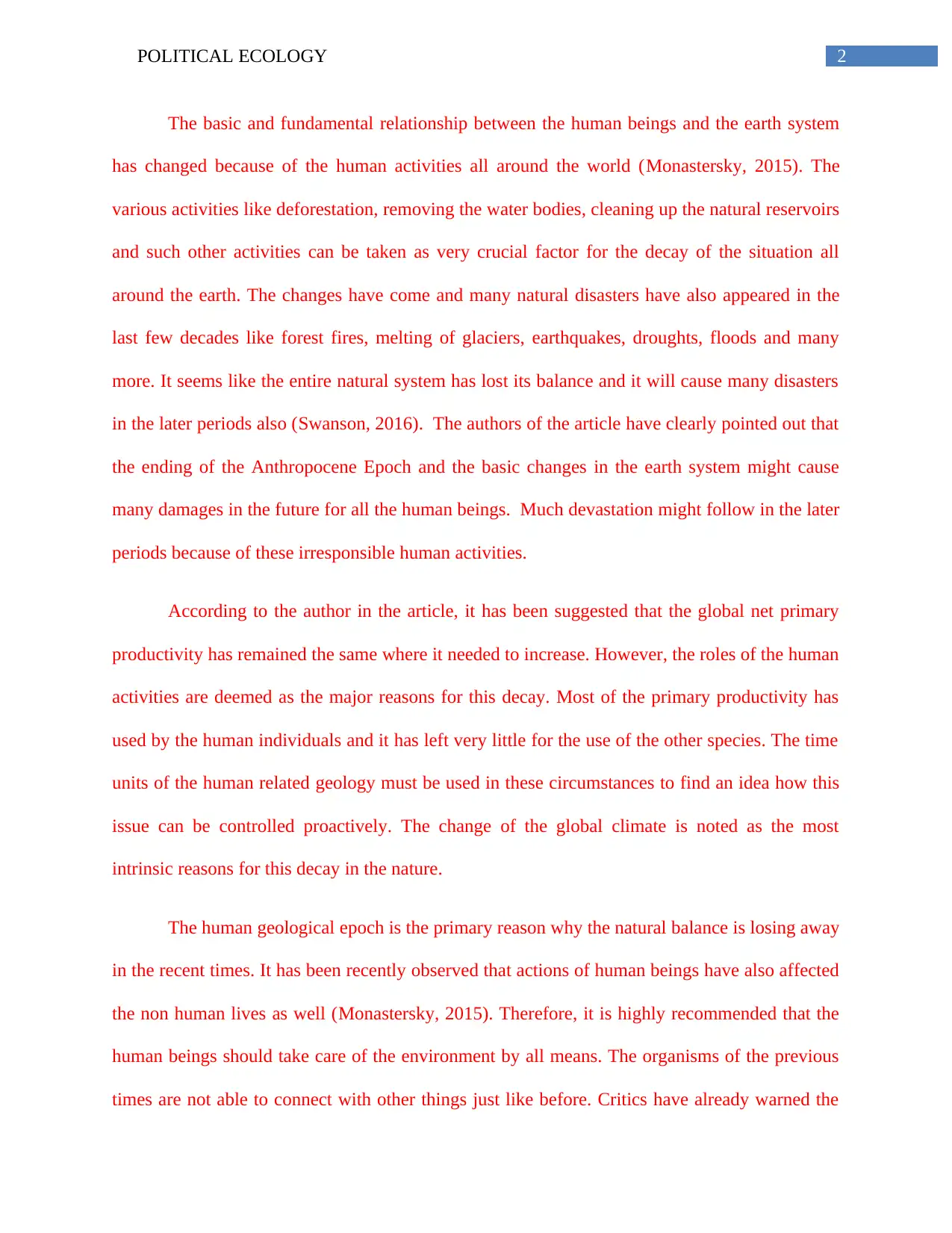
2POLITICAL ECOLOGY
The basic and fundamental relationship between the human beings and the earth system
has changed because of the human activities all around the world (Monastersky, 2015). The
various activities like deforestation, removing the water bodies, cleaning up the natural reservoirs
and such other activities can be taken as very crucial factor for the decay of the situation all
around the earth. The changes have come and many natural disasters have also appeared in the
last few decades like forest fires, melting of glaciers, earthquakes, droughts, floods and many
more. It seems like the entire natural system has lost its balance and it will cause many disasters
in the later periods also (Swanson, 2016). The authors of the article have clearly pointed out that
the ending of the Anthropocene Epoch and the basic changes in the earth system might cause
many damages in the future for all the human beings. Much devastation might follow in the later
periods because of these irresponsible human activities.
According to the author in the article, it has been suggested that the global net primary
productivity has remained the same where it needed to increase. However, the roles of the human
activities are deemed as the major reasons for this decay. Most of the primary productivity has
used by the human individuals and it has left very little for the use of the other species. The time
units of the human related geology must be used in these circumstances to find an idea how this
issue can be controlled proactively. The change of the global climate is noted as the most
intrinsic reasons for this decay in the nature.
The human geological epoch is the primary reason why the natural balance is losing away
in the recent times. It has been recently observed that actions of human beings have also affected
the non human lives as well (Monastersky, 2015). Therefore, it is highly recommended that the
human beings should take care of the environment by all means. The organisms of the previous
times are not able to connect with other things just like before. Critics have already warned the
The basic and fundamental relationship between the human beings and the earth system
has changed because of the human activities all around the world (Monastersky, 2015). The
various activities like deforestation, removing the water bodies, cleaning up the natural reservoirs
and such other activities can be taken as very crucial factor for the decay of the situation all
around the earth. The changes have come and many natural disasters have also appeared in the
last few decades like forest fires, melting of glaciers, earthquakes, droughts, floods and many
more. It seems like the entire natural system has lost its balance and it will cause many disasters
in the later periods also (Swanson, 2016). The authors of the article have clearly pointed out that
the ending of the Anthropocene Epoch and the basic changes in the earth system might cause
many damages in the future for all the human beings. Much devastation might follow in the later
periods because of these irresponsible human activities.
According to the author in the article, it has been suggested that the global net primary
productivity has remained the same where it needed to increase. However, the roles of the human
activities are deemed as the major reasons for this decay. Most of the primary productivity has
used by the human individuals and it has left very little for the use of the other species. The time
units of the human related geology must be used in these circumstances to find an idea how this
issue can be controlled proactively. The change of the global climate is noted as the most
intrinsic reasons for this decay in the nature.
The human geological epoch is the primary reason why the natural balance is losing away
in the recent times. It has been recently observed that actions of human beings have also affected
the non human lives as well (Monastersky, 2015). Therefore, it is highly recommended that the
human beings should take care of the environment by all means. The organisms of the previous
times are not able to connect with other things just like before. Critics have already warned the
⊘ This is a preview!⊘
Do you want full access?
Subscribe today to unlock all pages.

Trusted by 1+ million students worldwide
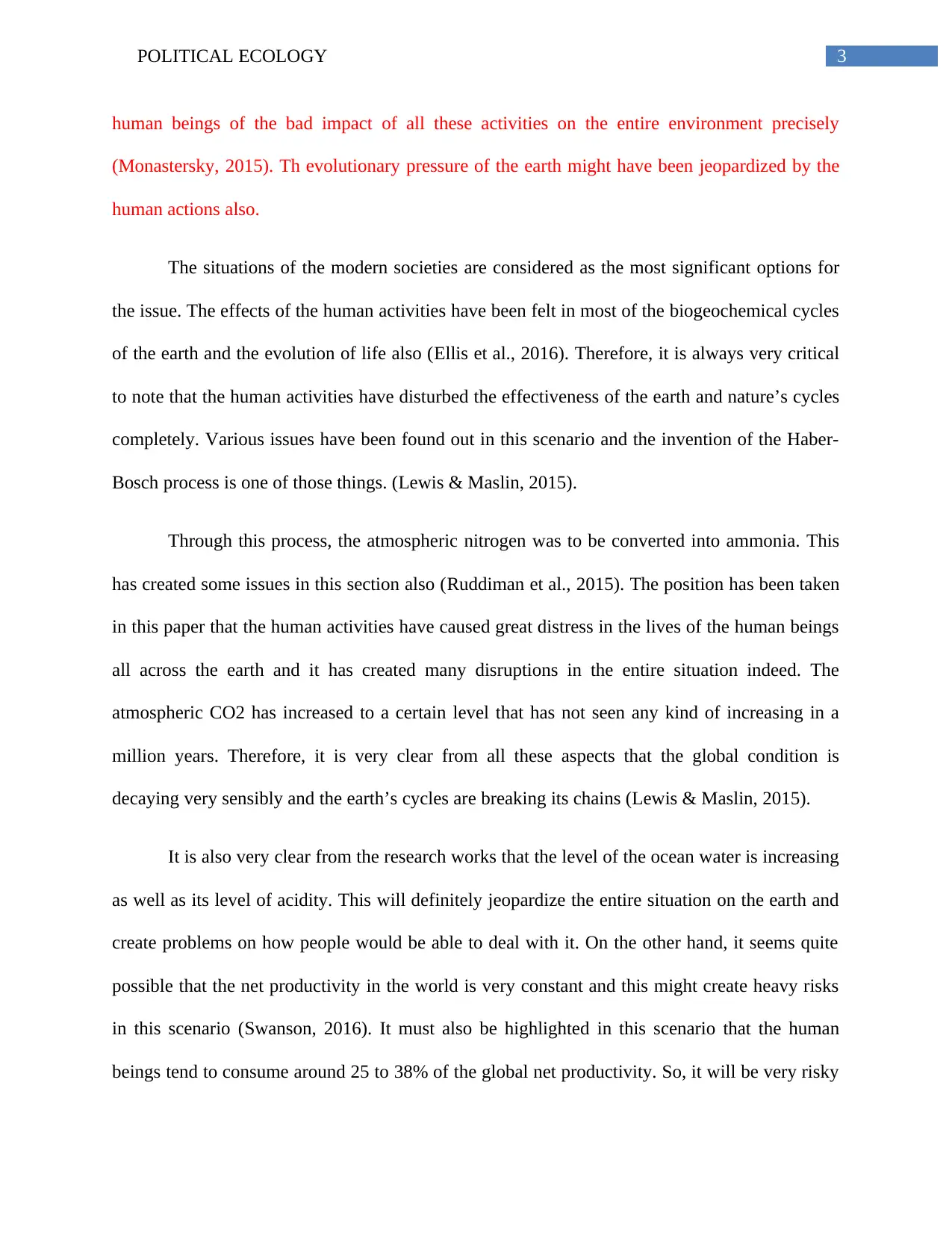
3POLITICAL ECOLOGY
human beings of the bad impact of all these activities on the entire environment precisely
(Monastersky, 2015). Th evolutionary pressure of the earth might have been jeopardized by the
human actions also.
The situations of the modern societies are considered as the most significant options for
the issue. The effects of the human activities have been felt in most of the biogeochemical cycles
of the earth and the evolution of life also (Ellis et al., 2016). Therefore, it is always very critical
to note that the human activities have disturbed the effectiveness of the earth and nature’s cycles
completely. Various issues have been found out in this scenario and the invention of the Haber-
Bosch process is one of those things. (Lewis & Maslin, 2015).
Through this process, the atmospheric nitrogen was to be converted into ammonia. This
has created some issues in this section also (Ruddiman et al., 2015). The position has been taken
in this paper that the human activities have caused great distress in the lives of the human beings
all across the earth and it has created many disruptions in the entire situation indeed. The
atmospheric CO2 has increased to a certain level that has not seen any kind of increasing in a
million years. Therefore, it is very clear from all these aspects that the global condition is
decaying very sensibly and the earth’s cycles are breaking its chains (Lewis & Maslin, 2015).
It is also very clear from the research works that the level of the ocean water is increasing
as well as its level of acidity. This will definitely jeopardize the entire situation on the earth and
create problems on how people would be able to deal with it. On the other hand, it seems quite
possible that the net productivity in the world is very constant and this might create heavy risks
in this scenario (Swanson, 2016). It must also be highlighted in this scenario that the human
beings tend to consume around 25 to 38% of the global net productivity. So, it will be very risky
human beings of the bad impact of all these activities on the entire environment precisely
(Monastersky, 2015). Th evolutionary pressure of the earth might have been jeopardized by the
human actions also.
The situations of the modern societies are considered as the most significant options for
the issue. The effects of the human activities have been felt in most of the biogeochemical cycles
of the earth and the evolution of life also (Ellis et al., 2016). Therefore, it is always very critical
to note that the human activities have disturbed the effectiveness of the earth and nature’s cycles
completely. Various issues have been found out in this scenario and the invention of the Haber-
Bosch process is one of those things. (Lewis & Maslin, 2015).
Through this process, the atmospheric nitrogen was to be converted into ammonia. This
has created some issues in this section also (Ruddiman et al., 2015). The position has been taken
in this paper that the human activities have caused great distress in the lives of the human beings
all across the earth and it has created many disruptions in the entire situation indeed. The
atmospheric CO2 has increased to a certain level that has not seen any kind of increasing in a
million years. Therefore, it is very clear from all these aspects that the global condition is
decaying very sensibly and the earth’s cycles are breaking its chains (Lewis & Maslin, 2015).
It is also very clear from the research works that the level of the ocean water is increasing
as well as its level of acidity. This will definitely jeopardize the entire situation on the earth and
create problems on how people would be able to deal with it. On the other hand, it seems quite
possible that the net productivity in the world is very constant and this might create heavy risks
in this scenario (Swanson, 2016). It must also be highlighted in this scenario that the human
beings tend to consume around 25 to 38% of the global net productivity. So, it will be very risky
Paraphrase This Document
Need a fresh take? Get an instant paraphrase of this document with our AI Paraphraser
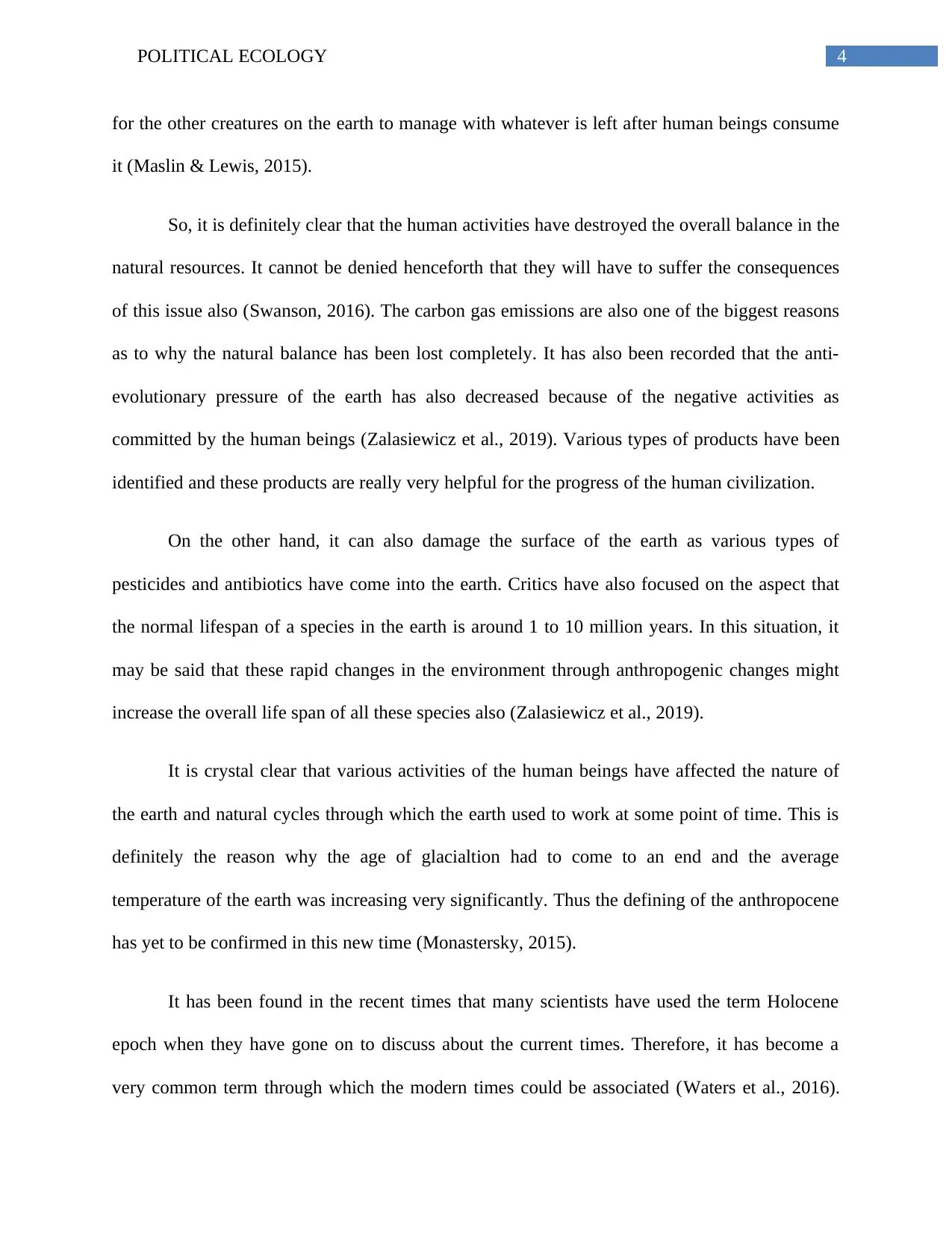
4POLITICAL ECOLOGY
for the other creatures on the earth to manage with whatever is left after human beings consume
it (Maslin & Lewis, 2015).
So, it is definitely clear that the human activities have destroyed the overall balance in the
natural resources. It cannot be denied henceforth that they will have to suffer the consequences
of this issue also (Swanson, 2016). The carbon gas emissions are also one of the biggest reasons
as to why the natural balance has been lost completely. It has also been recorded that the anti-
evolutionary pressure of the earth has also decreased because of the negative activities as
committed by the human beings (Zalasiewicz et al., 2019). Various types of products have been
identified and these products are really very helpful for the progress of the human civilization.
On the other hand, it can also damage the surface of the earth as various types of
pesticides and antibiotics have come into the earth. Critics have also focused on the aspect that
the normal lifespan of a species in the earth is around 1 to 10 million years. In this situation, it
may be said that these rapid changes in the environment through anthropogenic changes might
increase the overall life span of all these species also (Zalasiewicz et al., 2019).
It is crystal clear that various activities of the human beings have affected the nature of
the earth and natural cycles through which the earth used to work at some point of time. This is
definitely the reason why the age of glacialtion had to come to an end and the average
temperature of the earth was increasing very significantly. Thus the defining of the anthropocene
has yet to be confirmed in this new time (Monastersky, 2015).
It has been found in the recent times that many scientists have used the term Holocene
epoch when they have gone on to discuss about the current times. Therefore, it has become a
very common term through which the modern times could be associated (Waters et al., 2016).
for the other creatures on the earth to manage with whatever is left after human beings consume
it (Maslin & Lewis, 2015).
So, it is definitely clear that the human activities have destroyed the overall balance in the
natural resources. It cannot be denied henceforth that they will have to suffer the consequences
of this issue also (Swanson, 2016). The carbon gas emissions are also one of the biggest reasons
as to why the natural balance has been lost completely. It has also been recorded that the anti-
evolutionary pressure of the earth has also decreased because of the negative activities as
committed by the human beings (Zalasiewicz et al., 2019). Various types of products have been
identified and these products are really very helpful for the progress of the human civilization.
On the other hand, it can also damage the surface of the earth as various types of
pesticides and antibiotics have come into the earth. Critics have also focused on the aspect that
the normal lifespan of a species in the earth is around 1 to 10 million years. In this situation, it
may be said that these rapid changes in the environment through anthropogenic changes might
increase the overall life span of all these species also (Zalasiewicz et al., 2019).
It is crystal clear that various activities of the human beings have affected the nature of
the earth and natural cycles through which the earth used to work at some point of time. This is
definitely the reason why the age of glacialtion had to come to an end and the average
temperature of the earth was increasing very significantly. Thus the defining of the anthropocene
has yet to be confirmed in this new time (Monastersky, 2015).
It has been found in the recent times that many scientists have used the term Holocene
epoch when they have gone on to discuss about the current times. Therefore, it has become a
very common term through which the modern times could be associated (Waters et al., 2016).
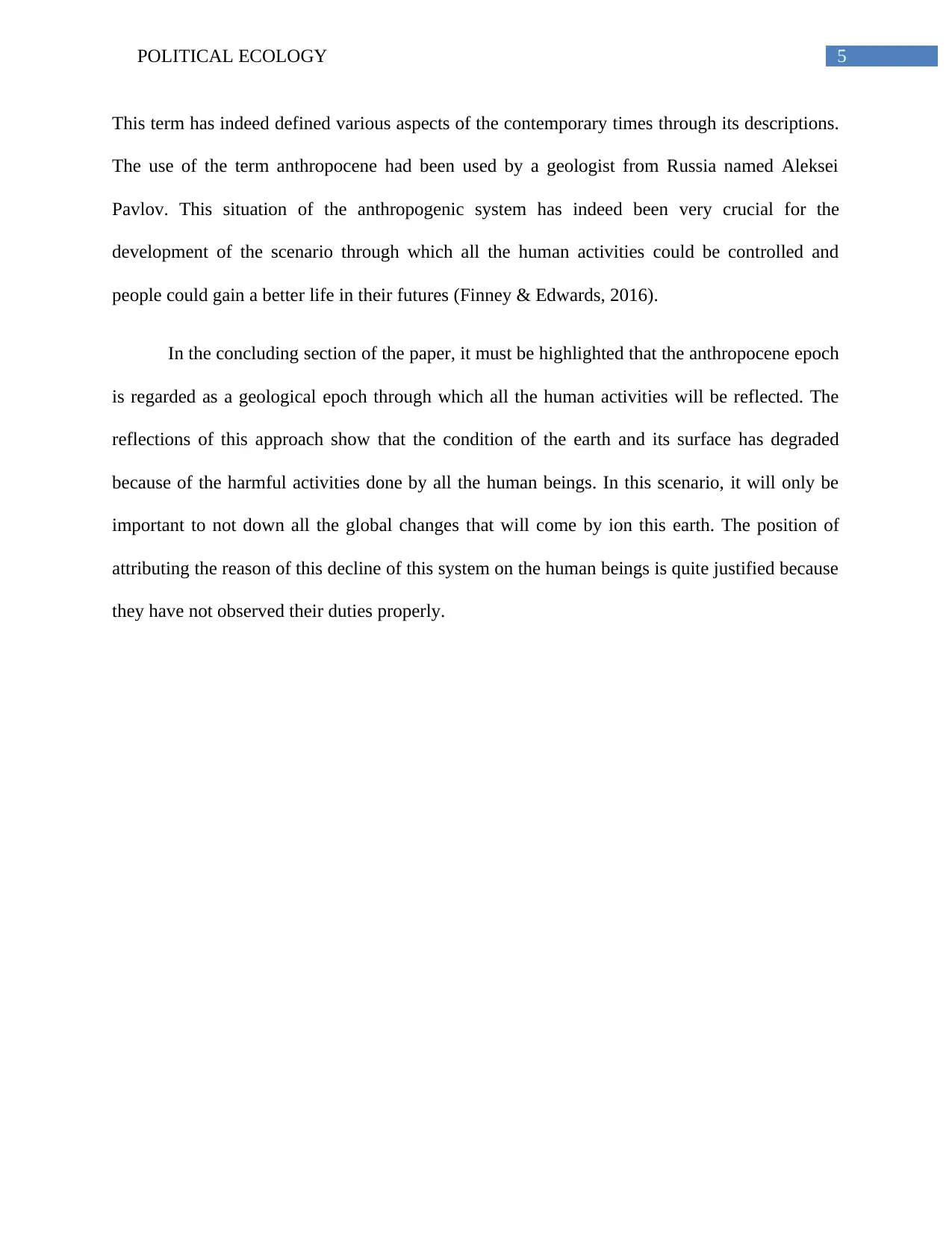
5POLITICAL ECOLOGY
This term has indeed defined various aspects of the contemporary times through its descriptions.
The use of the term anthropocene had been used by a geologist from Russia named Aleksei
Pavlov. This situation of the anthropogenic system has indeed been very crucial for the
development of the scenario through which all the human activities could be controlled and
people could gain a better life in their futures (Finney & Edwards, 2016).
In the concluding section of the paper, it must be highlighted that the anthropocene epoch
is regarded as a geological epoch through which all the human activities will be reflected. The
reflections of this approach show that the condition of the earth and its surface has degraded
because of the harmful activities done by all the human beings. In this scenario, it will only be
important to not down all the global changes that will come by ion this earth. The position of
attributing the reason of this decline of this system on the human beings is quite justified because
they have not observed their duties properly.
This term has indeed defined various aspects of the contemporary times through its descriptions.
The use of the term anthropocene had been used by a geologist from Russia named Aleksei
Pavlov. This situation of the anthropogenic system has indeed been very crucial for the
development of the scenario through which all the human activities could be controlled and
people could gain a better life in their futures (Finney & Edwards, 2016).
In the concluding section of the paper, it must be highlighted that the anthropocene epoch
is regarded as a geological epoch through which all the human activities will be reflected. The
reflections of this approach show that the condition of the earth and its surface has degraded
because of the harmful activities done by all the human beings. In this scenario, it will only be
important to not down all the global changes that will come by ion this earth. The position of
attributing the reason of this decline of this system on the human beings is quite justified because
they have not observed their duties properly.
⊘ This is a preview!⊘
Do you want full access?
Subscribe today to unlock all pages.

Trusted by 1+ million students worldwide
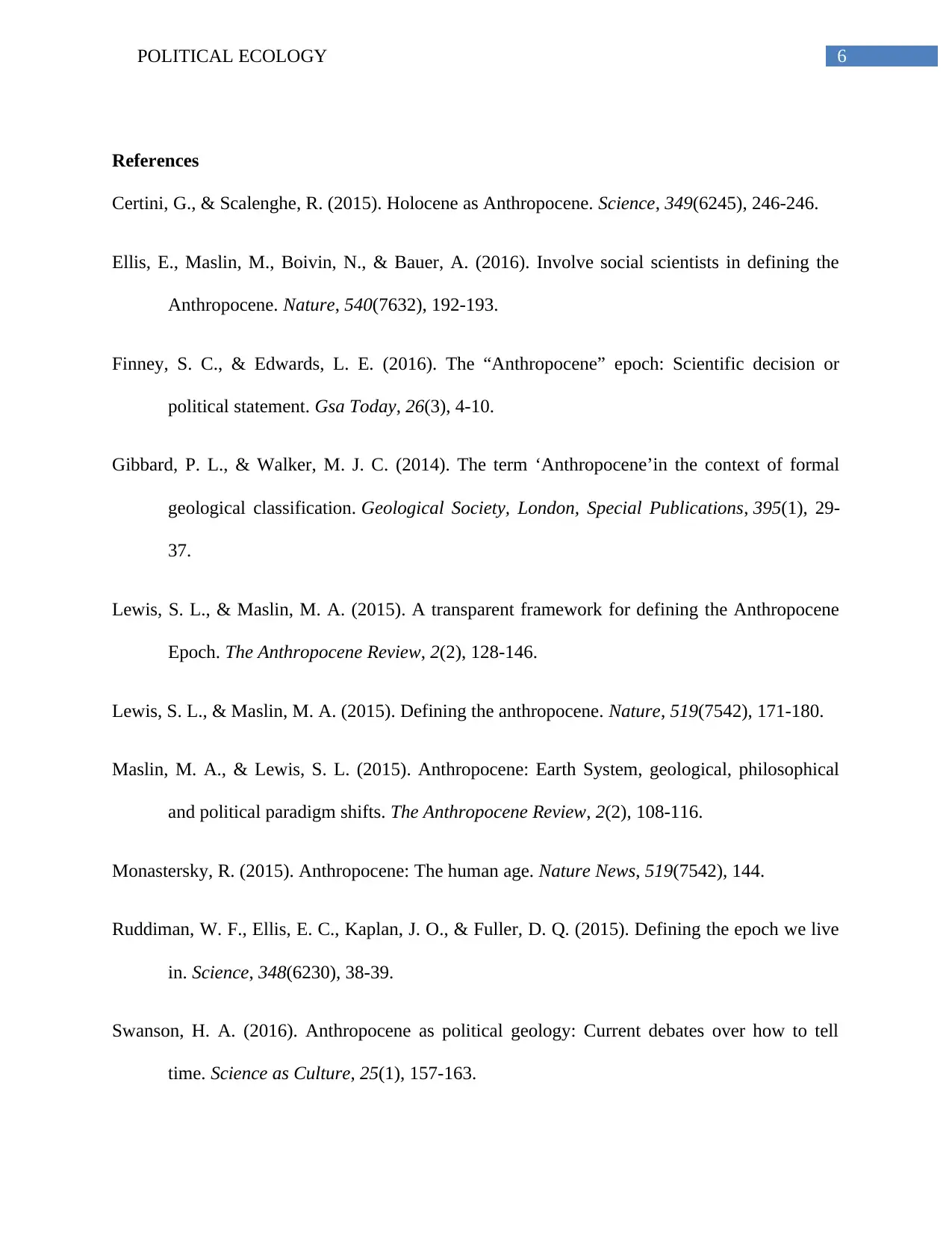
6POLITICAL ECOLOGY
References
Certini, G., & Scalenghe, R. (2015). Holocene as Anthropocene. Science, 349(6245), 246-246.
Ellis, E., Maslin, M., Boivin, N., & Bauer, A. (2016). Involve social scientists in defining the
Anthropocene. Nature, 540(7632), 192-193.
Finney, S. C., & Edwards, L. E. (2016). The “Anthropocene” epoch: Scientific decision or
political statement. Gsa Today, 26(3), 4-10.
Gibbard, P. L., & Walker, M. J. C. (2014). The term ‘Anthropocene’in the context of formal
geological classification. Geological Society, London, Special Publications, 395(1), 29-
37.
Lewis, S. L., & Maslin, M. A. (2015). A transparent framework for defining the Anthropocene
Epoch. The Anthropocene Review, 2(2), 128-146.
Lewis, S. L., & Maslin, M. A. (2015). Defining the anthropocene. Nature, 519(7542), 171-180.
Maslin, M. A., & Lewis, S. L. (2015). Anthropocene: Earth System, geological, philosophical
and political paradigm shifts. The Anthropocene Review, 2(2), 108-116.
Monastersky, R. (2015). Anthropocene: The human age. Nature News, 519(7542), 144.
Ruddiman, W. F., Ellis, E. C., Kaplan, J. O., & Fuller, D. Q. (2015). Defining the epoch we live
in. Science, 348(6230), 38-39.
Swanson, H. A. (2016). Anthropocene as political geology: Current debates over how to tell
time. Science as Culture, 25(1), 157-163.
References
Certini, G., & Scalenghe, R. (2015). Holocene as Anthropocene. Science, 349(6245), 246-246.
Ellis, E., Maslin, M., Boivin, N., & Bauer, A. (2016). Involve social scientists in defining the
Anthropocene. Nature, 540(7632), 192-193.
Finney, S. C., & Edwards, L. E. (2016). The “Anthropocene” epoch: Scientific decision or
political statement. Gsa Today, 26(3), 4-10.
Gibbard, P. L., & Walker, M. J. C. (2014). The term ‘Anthropocene’in the context of formal
geological classification. Geological Society, London, Special Publications, 395(1), 29-
37.
Lewis, S. L., & Maslin, M. A. (2015). A transparent framework for defining the Anthropocene
Epoch. The Anthropocene Review, 2(2), 128-146.
Lewis, S. L., & Maslin, M. A. (2015). Defining the anthropocene. Nature, 519(7542), 171-180.
Maslin, M. A., & Lewis, S. L. (2015). Anthropocene: Earth System, geological, philosophical
and political paradigm shifts. The Anthropocene Review, 2(2), 108-116.
Monastersky, R. (2015). Anthropocene: The human age. Nature News, 519(7542), 144.
Ruddiman, W. F., Ellis, E. C., Kaplan, J. O., & Fuller, D. Q. (2015). Defining the epoch we live
in. Science, 348(6230), 38-39.
Swanson, H. A. (2016). Anthropocene as political geology: Current debates over how to tell
time. Science as Culture, 25(1), 157-163.
Paraphrase This Document
Need a fresh take? Get an instant paraphrase of this document with our AI Paraphraser
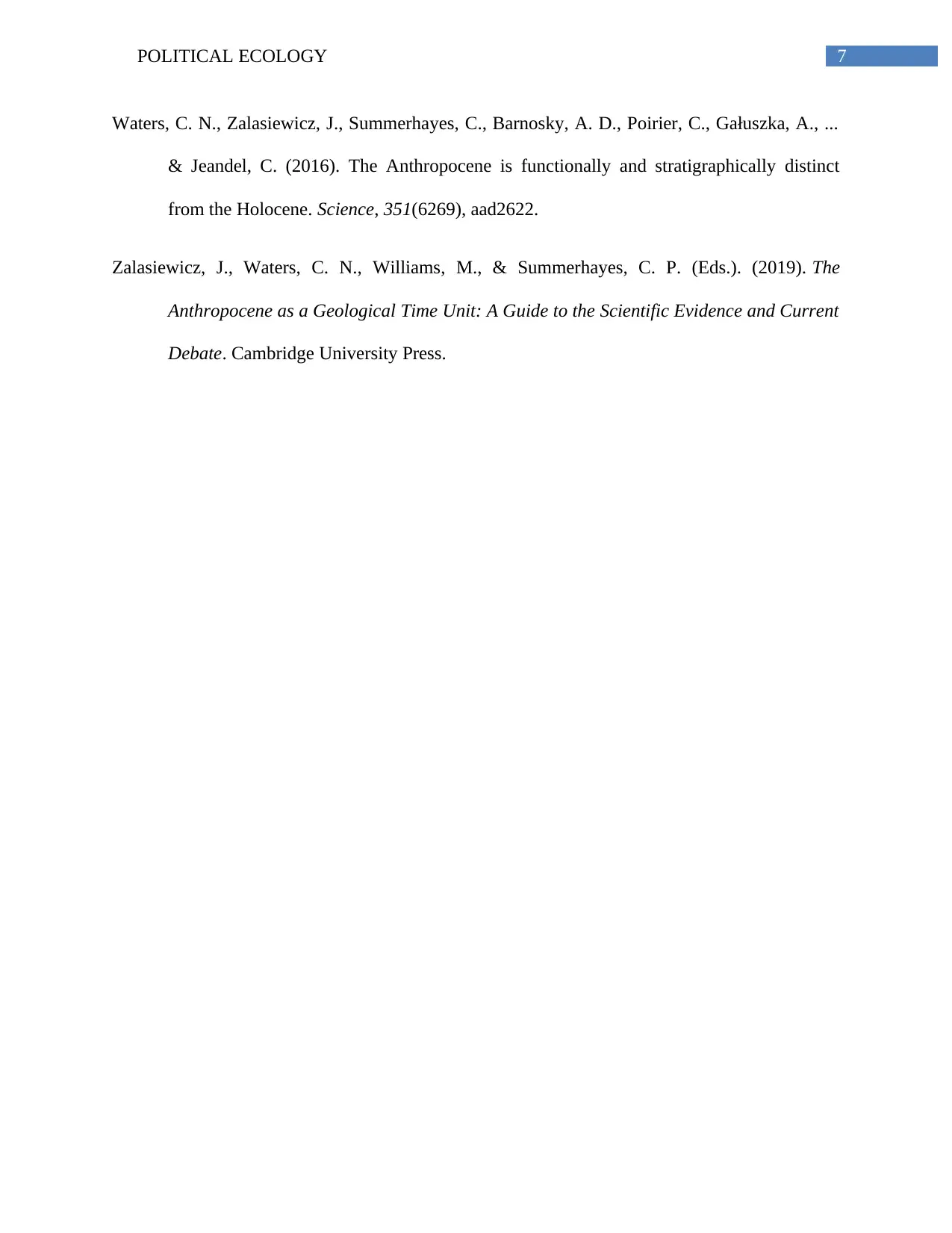
7POLITICAL ECOLOGY
Waters, C. N., Zalasiewicz, J., Summerhayes, C., Barnosky, A. D., Poirier, C., Gałuszka, A., ...
& Jeandel, C. (2016). The Anthropocene is functionally and stratigraphically distinct
from the Holocene. Science, 351(6269), aad2622.
Zalasiewicz, J., Waters, C. N., Williams, M., & Summerhayes, C. P. (Eds.). (2019). The
Anthropocene as a Geological Time Unit: A Guide to the Scientific Evidence and Current
Debate. Cambridge University Press.
Waters, C. N., Zalasiewicz, J., Summerhayes, C., Barnosky, A. D., Poirier, C., Gałuszka, A., ...
& Jeandel, C. (2016). The Anthropocene is functionally and stratigraphically distinct
from the Holocene. Science, 351(6269), aad2622.
Zalasiewicz, J., Waters, C. N., Williams, M., & Summerhayes, C. P. (Eds.). (2019). The
Anthropocene as a Geological Time Unit: A Guide to the Scientific Evidence and Current
Debate. Cambridge University Press.
1 out of 8
Related Documents
Your All-in-One AI-Powered Toolkit for Academic Success.
+13062052269
info@desklib.com
Available 24*7 on WhatsApp / Email
![[object Object]](/_next/static/media/star-bottom.7253800d.svg)
Unlock your academic potential
Copyright © 2020–2026 A2Z Services. All Rights Reserved. Developed and managed by ZUCOL.





